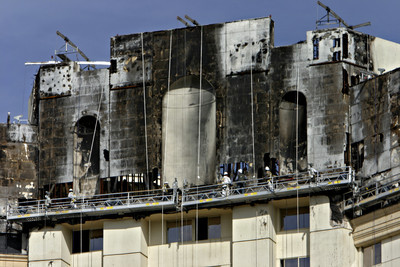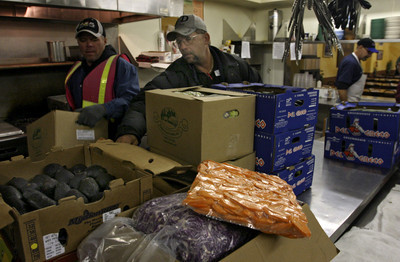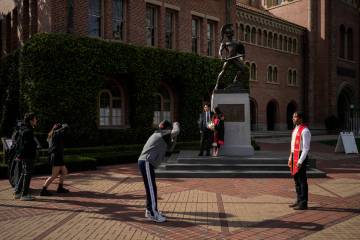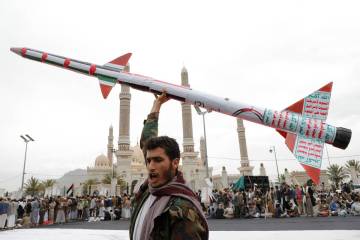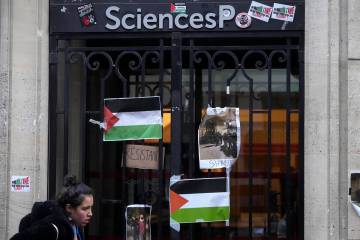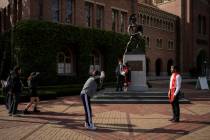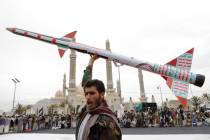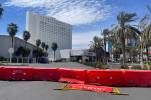Monte Carlo investigation looks at ‘hot work’ permit
Welding on the Monte Carlo rooftop might be a factor in the three-alarm fire that forced the Strip hotel-casino to empty on Friday, a hotel executive said, but he and the Clark County Fire Department disagree on whether a permit was obtained for the welding.
"It's probably safe and accurate to say that the investigation is focusing on the welding that was going on," said Alan Feldman, a senior vice president of MGM Mirage, which owns the Monte Carlo.
The Fire Department has no record of an active "hot work" permit for that location on that day, according to Deputy Chief Girard Page. Hot work includes welding, soldering and brazing, techniques for connecting pieces of metal.
The Fire Department's hot work regulation "says clearly there has to be a permit, for either a permanent or a temporary site," said Page, who heads the fire prevention bureau, which issues the permits.
"This is where we get into a little bit of confusion about who is saying what to whom," Feldman said Tuesday.
According to Feldman, the contractor generated the proper "hot work" permit paperwork Friday morning at the Monte Carlo.
The welders also were working under a more general building permit issued Nov. 29 by the county building division for the installation of window-washing equipment, Feldman said.
But Page, who was speaking of department procedures in general, said he could not envision a scenario in which the fire inspector responsible for any given hotel, such as the Monte Carlo, would not be notified that welding was taking place.
The deputy chief wouldn't comment on the department's investigation into the Monte Carlo blaze, which has not pinpointed a cause.
Feldman didn't want to speculate on whether rooftop welders Friday were working immediately above the area of upper façade that caught fire and discharged black smoke over the Strip.
Clark County spokesman Dan Kulin said no timetable had been set for completing the investigation to determine the fire's cause. Nor is there a timetable for reopening the 32-story hotel and casino.
The Fire Department over the weekend issued an order for resort officials to remove or secure the part of the facade that is damaged, Kulin said. Once the work is done to the satisfaction of inspectors, the building will be allowed to reopen.
According to Gordon Absher, vice president of public affairs for MGM Mirage, several hundred construction workers have been brought in by the contractor to work 24 hours a day on the "remediation project."
"Reduced winds allowed rooftop work to proceed, and crews began installation of scaffolding and other equipment that will provide a platform for work and inspection," Absher said. "Consultants, engineers and MGM Mirage development professionals continue their inspections and analysis which will lead to a timeline for the reopening of the hotel."
Union Erectors is listed as the contractor on the Monte Carlo's building permit for installing window washing equipment.
Responding to a telephone call Tuesday to Union Erectors, John Hershberger twice answered, "I got no comment," when asked if the company had done welding on the Monte Carlo roof, and when asked for his title.
The Nevada State Contractors Board Web site lists a John Hershberger as a company principal.
A Web site for a Union Erectors in Las Vegas identifies steel fabricating and installation as its specialty. Jobs completed at Strip hotels, including the MGM Grand and Venetian, are touted on the Web site.
Requirements for a hot work permit are spelled out on the Fire Department's Web site. The operator must turn in paperwork that shows the location of any welding in relation to combustible materials, elevators, stairs or exits. The paperwork also must show the location of ventilation equipment and fire extinguishers.
In addition, the party must put in writing what type of hot work will be done, and how a fire watch will be handled. A fire watch entails personnel to track sparks or hot "slag" falling during the job. A watch doesn't end until 30 minutes after the job, to make sure nothing unexpected has ignited and is smoldering.
Terry Taylor, a fire investigator in Northern Nevada, said slag dropped during welding can involve particles heated to more than 1,500 degrees Fahrenheit.
Review-Journal writer Paul Harasim contributed to this report.
Contact reporter Joan Whitely at jwhitely@reviewjournal.com or (702) 383-0268.
ON THE WEB CLARK COUNTY FIRE DEPARTMENT HOT WORKS PERMIT INFORMATION RELATED STORY 911 caller saw black smoke, then flames erupt at hotel View video and photo slideshows of fire



